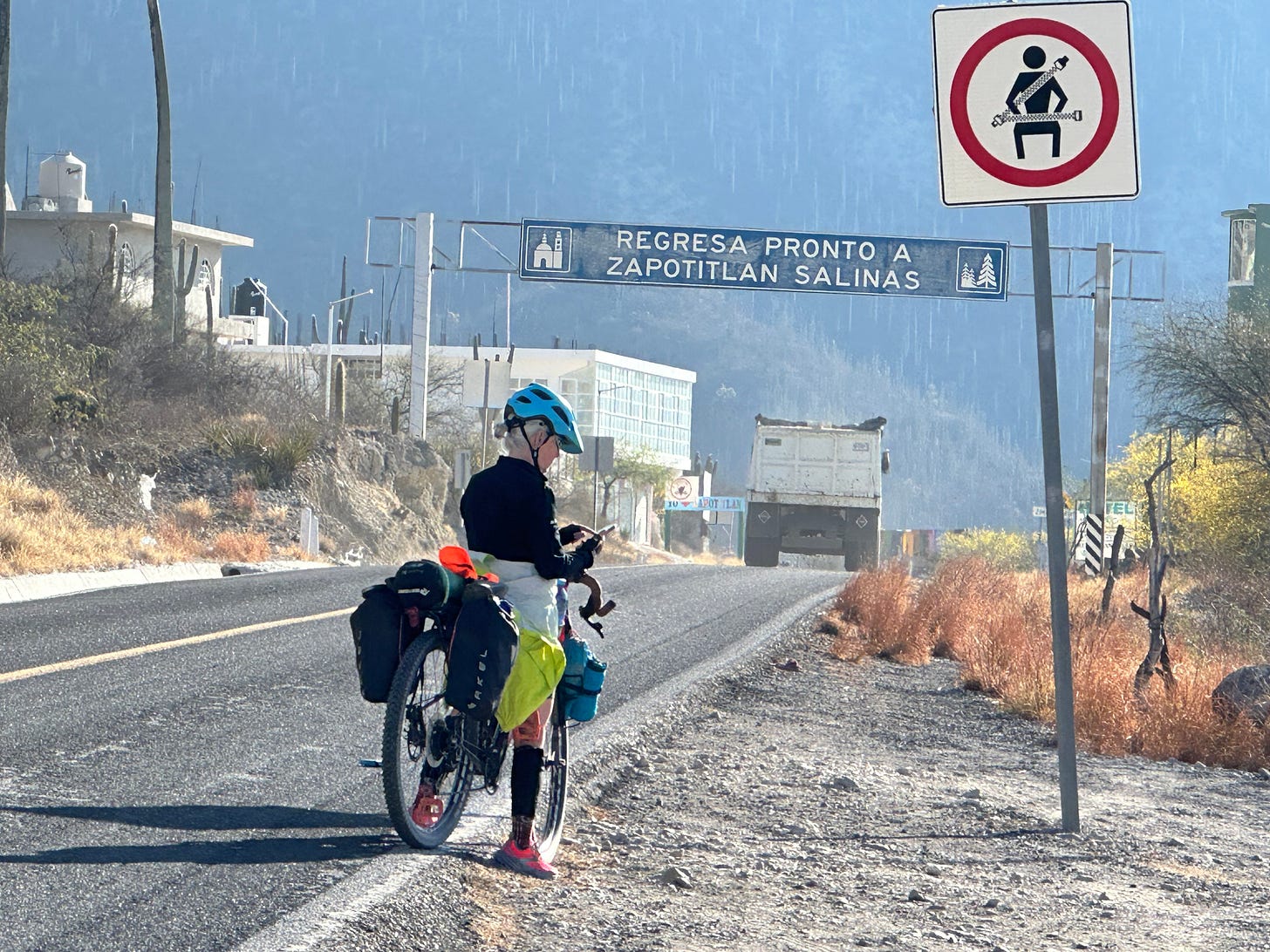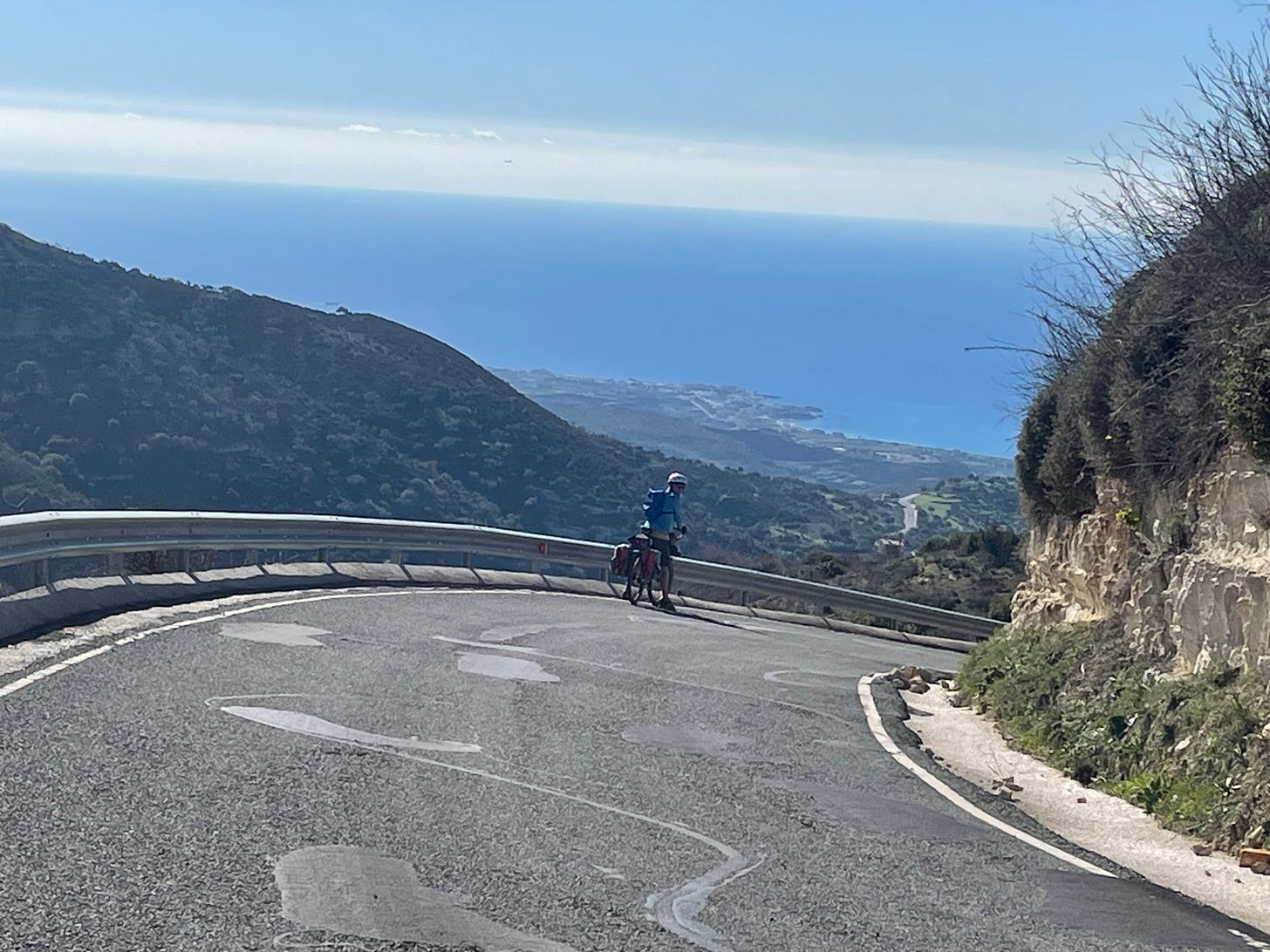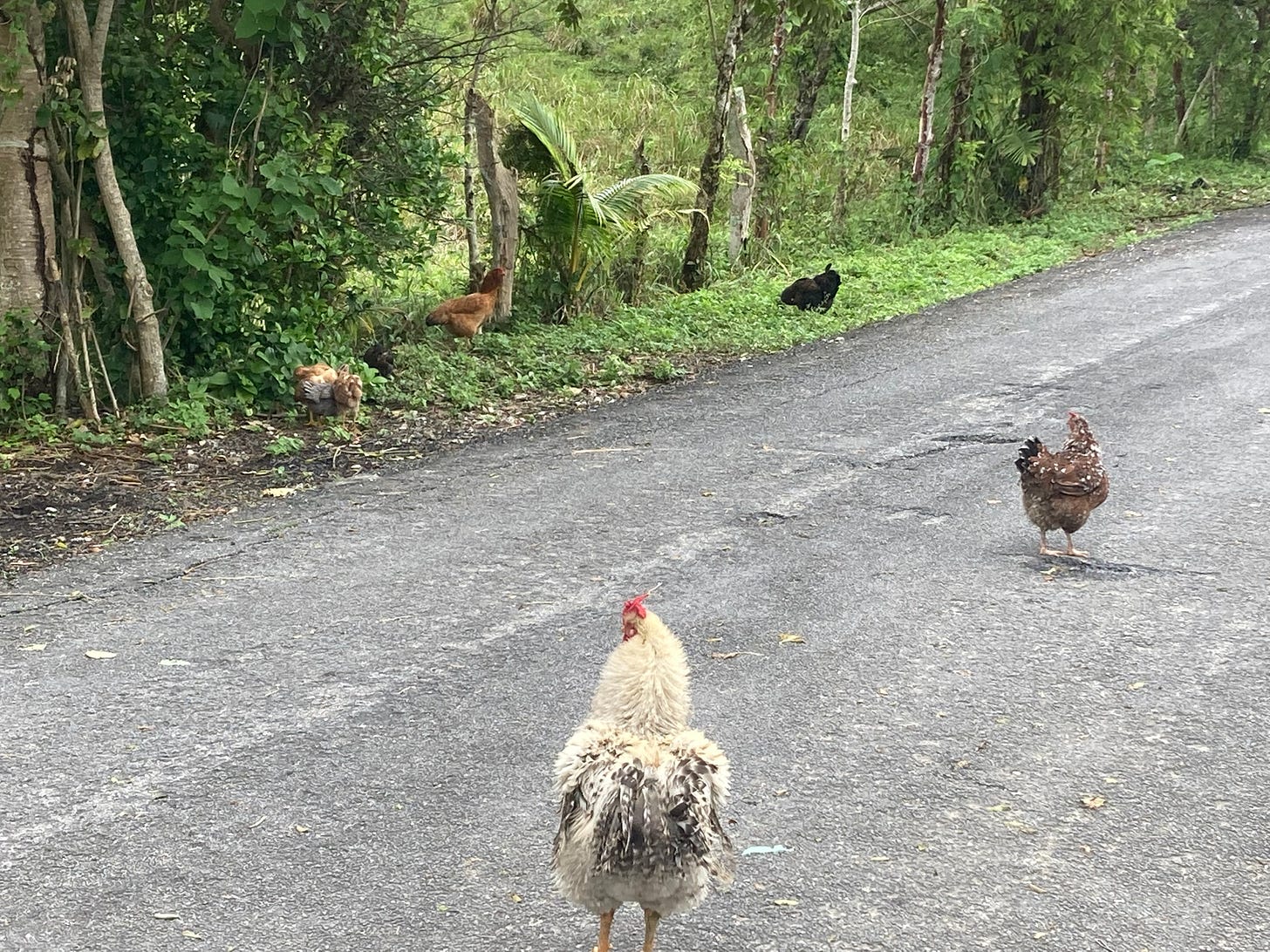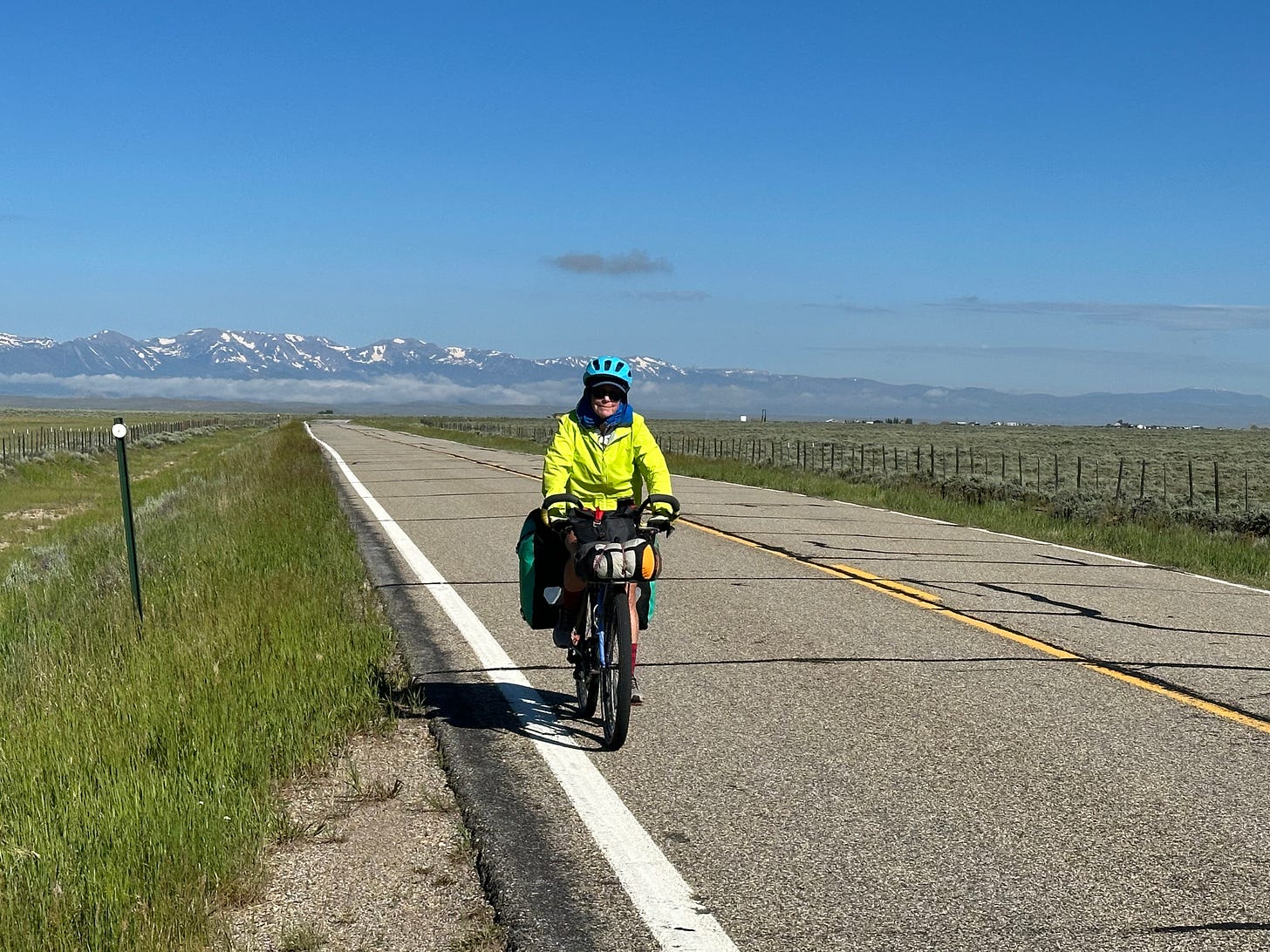Seventy Trips Around the Sun
Featuring a Guest Essay by Pamela Griffin
Note: Most readers of this Substack know that Pam and I have been cycling together for about 45 years, and have been married nearly that long. Indeed, we tied the knot at the end of our first cross-country bike ride in 1982. Feeling the march of time, we accelerated our longer-distance bikepacking and touring in 2019, upon retiring from our respective careers. The below post from Pam, the first of several guest essays from various bike-oriented writers that I will publish here, reflects on turning 70 while still pedaling far and wide.
Going Down the Road, Feeling Good
By Pam Griffin
I turned 70 on our recent 3000 mile, 4 month, bike trip from Amsterdam to Athens to Cyprus. It’s just a number, but it is a big one, and it demanded some of my attention. No one is more surprised than me that I am still riding my bike on extended journeys.
I looked over Glen’s initial Substack post about “Revisiting the Past,” and realized that it was published nearly 4 years ago, and I was 66. Not surprisingly, we both look younger in the pictures on that page. Our plan at that time was to bike all over the world as much as possible, for as long as possible, and that is what we have been doing. Many of the trips have been quite difficult; each one has been its own adventure. We are batting around ideas for our next one.
Now that I am a full-fledged 70, two questions come to mind: How is it that I am able to continue to do these sometimes difficult trips and, perhaps more perplexing, why do I keep doing this? My “goal” is to continue cycling fun, long distance, high endurance, rides for many years to come. How and why?
How?
Certainly, there is a strong motivation, coming from somewhere, behind the effort. Like Iohan Gueorguiev (do look him up), I just want to see the world by bicycle. This really responds to both how and why. I have always recognized that “doing hard things” has a reward. It’s undeniably fun. I discovered at a young age that the pain involved in hiking or biking “up that damn mountain” rewards you with fantastic views, a dopamine boost, a good story, camaraderie with fellow hiker/bikers, and, perhaps most importantly, the ability to have a cheeseburger and fries with no regrets. Cycling (and hiking) is the only way I have found to experience euphoria without drugs, though those moments are admittedly few and far between. Nevertheless, they are exhilarating and wonderful.
Is there something special about my diet and exercise routine that keeps me at a decent fitness baseline and propels me in the direction of long bike trips? No. I eat fairly healthy and have exercised my whole life, but, believe me, others have eaten healthier and exercised more. I am not a fitness fanatic, so it’s not that simple. I have always wondered how much of this late-in-life lifestyle is actually under my direct control. I have many friends my age (OK, I am the oldest, but they are not that far behind) who are fit and healthy. But, I am also close to people who have had crippling mental health problems and addiction. Have we all “chosen” the lives we lead? To a very great extent, I do not believe that these are conscious decisions. I think I was born with a certain mental framework that has enabled me to continue to successfully struggle against the reality that life can be very, very hard, and then to move on, hoping for better days.
I do have some good genes lurking among my chromosomes, although they are of course no guarantee. My grandmother had tremendous joie de vie with two beers every night while watching Johnny Carson and smoking her whole life. She lived into her 90s. My other grandmother, despite working in the sweat shop mills of Massachusetts in the first half of the 20th century, also lived into her 90s. My Dad biked and kayaked well into his 80s and his sister, in her 90s, just exchanged her daily golf game for a daily swim. I hope to follow in these footsteps, knowing that luck is also part of the equation. We all know very healthy people who have died prematurely. We just do our best and see where life takes us, attempting to reduce the risk factors as much as possible.
I recognize I am part and parcel of the surge of boomers who are performing way above our early expectations regarding age. Watch Mick Jagger dancing with Taylor Swift. A 100 year old woman who broke a Master’s running record, not satisfied with the result, trained all year and broke her own record the next year. We see these stories and they let us know what may be possible. These things inspire me. Hmm, I guess that’s also “why.”
Certainly, health and medicine have evolved, for the better, over time. Of course, pain is a companion, but when it does strike a leg, for example, it is time to focus on the arms. I am adding weight training to my regimen since we now know that we lose 1% of our muscle mass every year after the age of 40 unless this inexorable process is countered with some kind of workout. Yikes. I take recovery more seriously. I take no supplements that have not been determined to be effective in randomized clinical trials. Health information, via modern media and the new ‘wellness’ community. often present a confusing picture of what is healthy. Unfortunately, politics and big money have infected this information sphere and there is a lot of quackery out there. One has to take care where you get your information, and ensure it is truly backed by valid science. RFK, Jr., I’m looking at you.
This I do know: you can do more than you think you can. I test this regularly on our rides. Recently in Cyprus, after a long grueling climb, we arrived at the last turn with a couple miles to go and discovered the road impassable. We had no choice but to go back another 25 miles along a rough coastal trail to arrive at our room just as it was getting dark. Whew! But it shows there is usually more power in reserve than you think might be the case, even as an older adult. Adrenaline helps.
Here is something interesting: humans have evolved two different tendencies. The first is to do hard things so that you can survive an attack by the Mastodon. The other is to rest up so that when the Mastodon arrives, you have the energy to attack. These tendencies survive in the modern genome. Many modern humans are experiencing what some call “the comfort crisis.” This arises from the rest-up tendency described above and, as a result, we tend to seek increasing comfort, especially as we age. This inactivity, when prolonged at any age, tends to lead to mental and physical health issues, and decline. Regardless of one’s physical condition, some movement, any movement, can only be beneficial. I take this seriously.
On the other hand, if we do the hard things that enable us to ‘escape the Mastodon’, that is, embrace the discomfort necessary to build strength and endurance, it will often lead to a happier and healthier life (see above rewards from hiking the damn mountain). Although, as my uncle once told me, my theory sounded like banging your head against a wall because once you stop, it feels better. I admit there is something to that. Nevertheless, I think this comfort cycle has a connection to the anxiety/mental health crisis we find ourselves in. Humans simply have not evolved to sit (or stare at a screen) to the extent many of us find ourselves doing (me included).
Why?
So, I am grateful beyond belief that I can still pedal for miles on end, but the question of why I want to continue with long difficult cycling is both easier to answer and more complicated. It may be hard to explain if you haven’t been ‘bitten by the bug’ of endurance sports. Sir Hillary once rather smugly and glibly, in my opinion, replied to the question of why he climbed Mt. Everest: “If you have to ask, you won’t understand the answer.” Although our trips obviously do. not compare to Hillary’s and Tenzing’s ascent of Mt. Everest in the 1950s, answering the question of why is, for me, still difficult.
Riding along, hour after hour, gives you plenty of time to contemplate these questions; for example, what of the relative risks involved? Some have asked me how I think about the risk of riding alongside large and threatening vehicles, especially in countries that may not have the medical infrastructure to which we are accustomed, or the risk of riding in very remote locations (think Baja). Some level of risk is inherent in long-distance cycling. Why do I take these risks?
The principle reason is because, to me, it is worth it. The pace of bicycle travel, visiting parts of countries otherwise mostly inaccessible via other modes of transportation, physical challenge, learning new languages and meeting fascinating people make it so. These experiences make our lives richer. Life is short: Carpe Diem!
Of, course we make every effort to minimize the risk. I tend to be the navigator on our trips (we each take on certain tasks). I make every attempt possible to avoid busy roads. There is often an alternative route, though longer, that I will plug-in to our routing app. However, when there are no alternatives we deal with the danger by using handlebar mirrors, good lighting on our bikes, bright clothing and staying very alert. Of course, I have to point out, we encounter these same conditions at home where, at times, drivers can be less courteous. Bottom line is to not undertake undue risk, and maintain situational awareness at all times.
Overall, risk/reward is a personal thing that one must balance and manage all the time, and I take it seriously. But on the other hand, I know that I take more risks than many would at my, or any other age. It is just who I am, and helps to explain why I do what I do.
Stepping back to the bigger question of why: From a very early age I was fascinated by images and maps of foreign countries and people in National Geographic magazine. One of my favorite early books was Dervla Murphy’s solo bike trip from Ireland to India in 1963. Glen and I still have 1970s original maps that the government of Afghanistan sent to us when we dreamed about biking in the Hindu Kush in 1979 (My first touring bike was a Fuji named Kush). Unfortunately, that one never materialized.
Mentally and physically, I feel much better on our trips. Regular prolonged exercise outdoors makes my brain and body work better. It is hard to replicate that amount of exercise when we are home (though we do need the rest as well!) but I notice my memory is much better, and strength to climb hills returns, after a couple of weeks into a trip.
I am a wanderer. During my 50-plus years of being solidly in the work force, I hacked out three quite different careers. Perhaps I have ADHD. Or perhaps, as with many bikers, I really love seeing new things all the time; one never knows what is around the corner until the turn is made.
I also love being anonymous in different cultures and exploring. Bike travel brings meaning and purpose to my life. Learning about other cultures teaches you about your own culture and, necessarily, teaches you humility. Americans are not the center of the universe and, maybe, just maybe, other cultures are happier than ours, if not as wealthy. As a bike traveler you are more accessible to local people: you are more vulnerable and much less threatening. People engage with you. You learn.
We see and hear things: biking slowly through a rural Mexican village where you swear you are the first gringos ever to set foot (unlikely); conversing on a fairly deep level during a chance encounter with the Deputy Commander of the UN peace-keeping forces in Cyprus; the elderly Greek Cypriot woman dressed in black from headscarf to shoes, standing on a stepladder picking olives one by one; the lovely Irish woman working in Cyprus who tears up at the grocery store telling me about the 6 year old refugee student from Gaza who made her a very simple Christmas gift; the Turkish family that insisted we stop and share their delicious picnic of traditional foods. You meet wonderful people every day. Most just want to have a conversation, while others become lifelong friends (you know who you are).
All of these things influence the answer to the question of why. I guess regardless of the answer, I will continue to do the utmost to challenge myself physically and mentally. The bottom line, after all this reasoning: I just want to ride.
The Future
We now fear (as of January 20th, and quite reasonably) we will no longer be welcome in the rest of the world (maybe Russia or North Korea?). We wonder about our ideas to travel from Columbia to Argentina or western France to Azerbaijan. Would we be welcome? We fear we may have to stay homebound for the next four years, and I will be closing in on 75 at that point.
Sure, there are plenty of amazing things we have not seen in the US, despite three cross-country bike trips. It’s the idea that people in other countries would be glad to see us, in part, because we were American. How many times have I heard “I have a cousin in Chicago!” Now, we are the richest, most powerful country in the world and are using that power to bully, coerce and enrich our billionaires even more. Admired? Welcome? Doubtful. Perhaps reviled. This is not good for the American traveler, and makes us sad and not a little angry. This is not a politics post, so I will refrain from going on about this awful state of affairs.
Be that as it may, I anticipate our trips will become slower, and perhaps shorter, over the next decade. I know that there will come a day when one of us will no longer be able to do these long trips, or any trips at all. One never knows. The window will close. When that happens, I will continue to do the hardest things possible for my age. But, in the end, I will go home, get some chickens again and figure out how to optimize the last phase of my life. With eggs.
In any event, 70 is here, it feels good, and I am happy. I am grateful for my life, my friends and family (hi Zach & Sam!), and my home in Maine. My favorite store is still REI, and my go-to You Tube videos are of long distance bike races in the Atlas Mountains and elsewhere, and of Lael Wilcox cycling around the world in record time. Lael, I love you! I will continue to be a very annoying optimist and believe that the good guys do win in the end. The only thing I can control is my own life (and even that is limited) so I need to make sure that I live the rest of my days with care. It’s pretty simple: be the change you want to see in the world (Gandhi). That is what I strive for, on a bike.
Pam Griffin is a proud graduate of the University of Massachusetts, Amherst, where she obtained a degree in political philosophy. Her long distance biking pursuits began during that time frame, having biked across the US twice by the age of 27. She is also an accomplished hiker, having climbed 40 of the 48 four thousand-footers in the White Mountains, and still working on them). Pam pursued three careers spanning nearly 50 years as a paralegal, in landscape architecture, and a as wildlife biologist (bats and birds). Pam grew up in Massachusetts where her favorite memory is of camping on Cape Cod with her parents, 5 brothers and sisters, aunt, uncle, and 6 cousins, where they would all sit around a campfire and eat buckets of fresh clams.













Hi Pam, I loved reading your post. Ever since we met you both in Orvieto, I have felt so inspired by your journey and philosophy on life and really enjoyed reading more about what motivates you. We have been home in Australia for almost six months now and can’t believe that you are both still travelling. We’re extremely jealous! We are not bikers but we adored doing 15-30,000 steps every day on our one month trip and 100% know that the physical activity was an integral part of the joy on our holiday. As you said it’s so hard to keep that up at home. Please keep writing! I would love to see regular guest posts or even your own Substack ❤️All the best Heather
Well told. In traveling, the highest compliment I have been paid is being mistaken for Canadian. "You can't be from the US. You're too quiet and polite." A part I love about bike touring is you become the most vulnerable person in any interaction. You hide nothing on a bike so you disarm everyone. You are usually a mess of sweat and grease and exhaustion. You probably stink and you're thirsty -- a pilgrim on a hajj. You are the opposite of a threat, so people feel safe bearing witness to you.